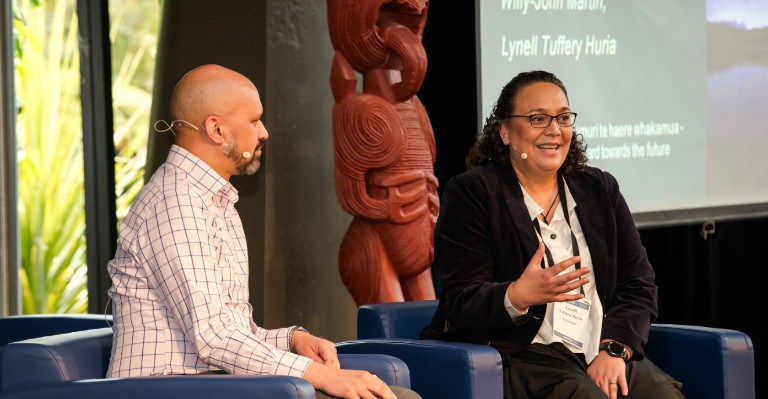IP is the currency you trade in
26 March 2024 | Read time: 5 minutes

In November 2023, SfTI held a very special All of Researchers’ Workshop in Rotorua. Amongst the highlights of the three-day wānanga was a fascinating conversation on intellectual property (IP) between Dr Willy-John Martin and Lynell Tuffery Huria.
Before becoming Director of Māori Research, Science and Innovation at MBIE, Willy-John was Manager of Vision Mātauranga & Capacity Development at SfTI. So, he was well placed to steer the kōrero with Lynell, a Patent Attorney and Managing Partner at Kāhui Legal. In the 45-minute session, the pair discussed a wide range of topics, including IP provision in research contracts, the importance of relationship-building, and legal protections for Mātauranga Māori.
Lynell described her career trajectory, admitting that she hadn’t set out to become a patent attorney. But she said what’s kept her in the field for 30 years is “…the mahi. It's really interesting working at the forefront of inventions, creations, and new developments.” Lynell is also a leading expert on indigenous intellectual property rights, Māori intellectual property and trademark protection. And as Willy-John reminded the audience, she brought all of those skills to bear when she worked with SfTI to help shape the Challenge’s IP policy; one that recognises the importance of Mātauranga Māori to Aotearoa New Zealand’s research landscape. Crediting the leadership of Willy-John and his team in this effort, Lynelle described the policy as “really quite innovative at the time. I think it was the first National Science Challenge to do that. And, probably one of the first research organizations to do that in Aotearoa. It was a real privilege to be a part of it.”
After providing a primer on the monetary value of intangible assets like IP and goodwill, Lynell urged researchers in the audience to consider these things early on in research collaborations. In addition, she said, it’s worth investing time in building relationships with people, as good relationships form the foundations of successful and productive careers. This is particularly important for work that involves Māori, taonga species, or Mātauranga.
“It's critical that you partner with Māori in these spaces,” she said. “And engage with early on. It's not appropriate anymore to call people two weeks before your application's due.”
“It's critical that you partner with Māori in these spaces,” she said. “And engage with early on. It's not appropriate anymore to call people two weeks before your application's due.”
Willy-John and Lynell then went on to talk about the need for a more flexible intellectual property system for Aotearoa; one that as Willy-John said reflects “how we actually live and the types of knowledges we use, and the types of collective ownership that are out there.” Giving the example of the 1994 Copyright Act that refers to only a limited set of electronic processes, Lynell said “The inability of the intellectual property system to adapt and grow to reflect the changes we're facing, that's one of the huge issues we have.” She contrasts this to the Mātauranga Māori knowledge system, describing it as “…an evolving system that ebbs and flows and develops as the world around us changes.”
She continued, painting a picture of a future IP system that could benefit everyone, “There's a holistic approach in Te ao Māori for collective benefit. [This knowledge] is actually everybody's and we can all access it. But that brings with it obligations. You need to ensure that it's protected, it's respected, and that some benefits flow back to where they should. It's just a different way of thinking about what you you're creating and how you share the benefits that flow from what you're creating.”
You can watch the entire conversation between Lynell and Willy-John here:
- Lynell Tuffery (Ngāti Ruanui, Ngāruahinerangi, Ngaa Rauru Kiitahi)
- Dr Willy-John Martin (Ngāti Wai, Ngāti Tamaterā)
Watch highlights from the panel session here: